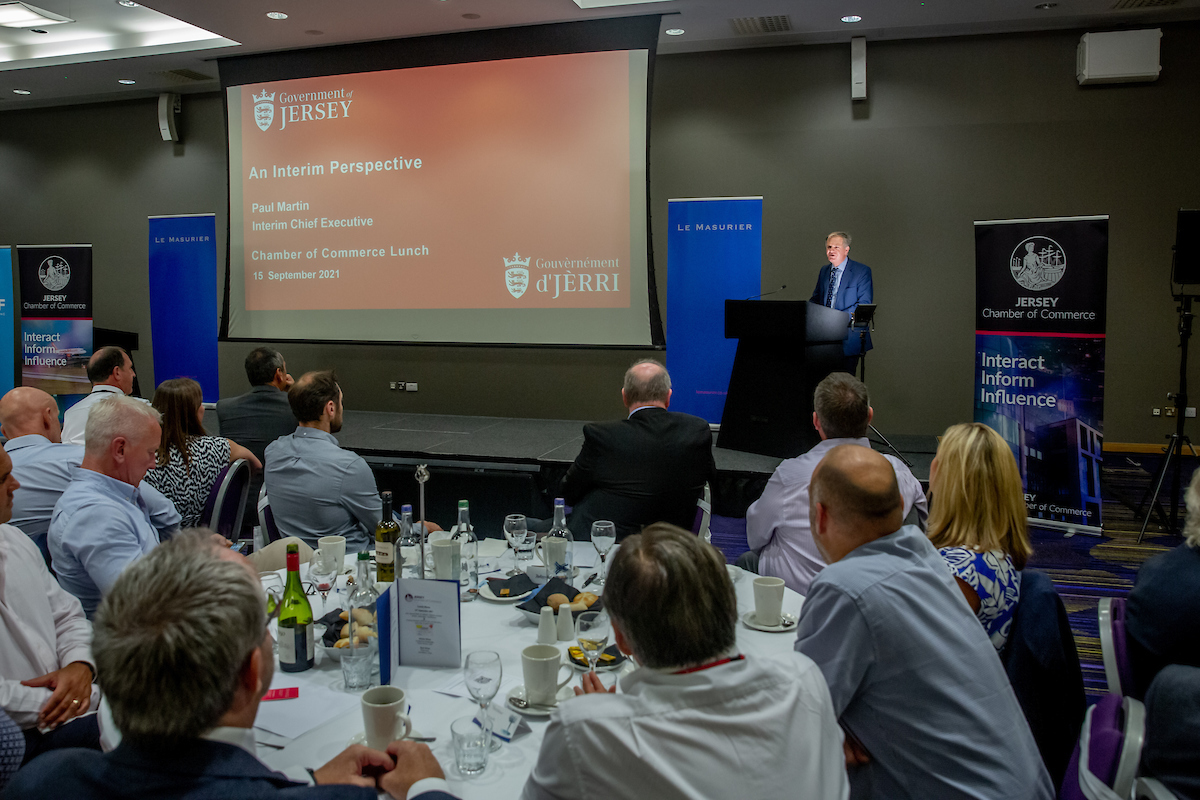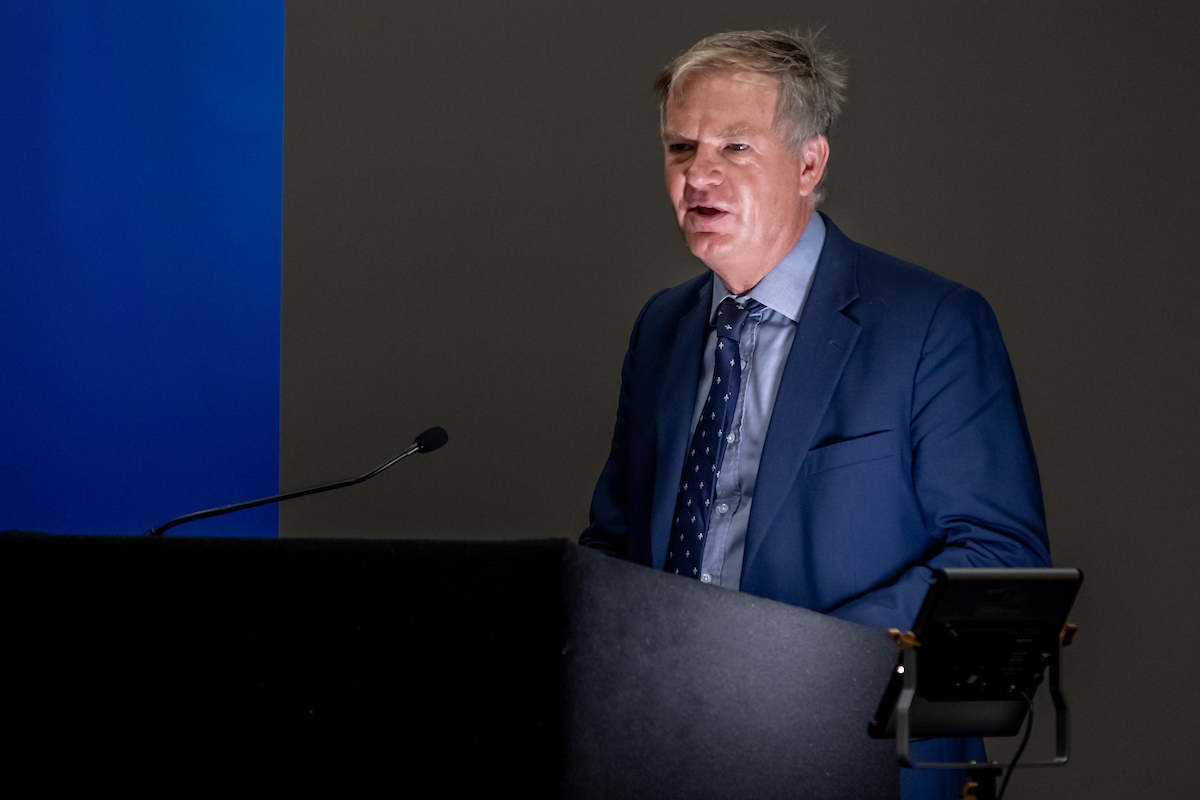


The growing “gap between the asset rich and cash poor” is at risk of “doing great damage to the island’s economy and future growth”, according to the island’s Interim Chief Executive, who also warned that the growth of the public sector workforce was "unsustainable".
Addressing a room full of the island’s business leaders in what was his first public speech since replacing Charlie Parker in March, Paul Martin yesterday told the Chamber of Commerce that covid had “intensified inequalities starkly”, something he said was clearest “in unaffordable housing.”
He said he hoped that the upcoming election would lead to “clarity and definition to the debate over the island's approach to tackling housing affordability.”
“Of course, increased housing supply is the crucial response to this challenge, but there are others that I will touch upon today including the island's population policy and also the need for us to adopt a more strategic approach to the usage of capital gains from selling public owned land as well as capturing planning gain more generally,” Mr Martin commented.
He went on to complain of a “tangled approach to priorities including social housing, other forms of affordable housing, investment in new services and improvements to local neighbourhood regeneration”, adding: “An incremental approach to decision making risks losing the benefits of a longer term and more strategic approach which is evidence based on where islanders feel that need is most pronounced.”

Pictured: Mr Martin presenting at yesterday's Chamber of Commerce lunch.
Directly addressing his audience on the topic of workforce challenges, Mr Martin predicted that accessing skilled local staff would be “one of our principal challenges in the coming years”, and appealed to them to be an “active voice in the population debate that will be considered by the Assembly in December.”
Noting that he was “pleased we were able to work with the hospitality industry earlier this summer to quickly make changes to employ migrant staff already on the island”, he added: “We need to help back into work the 1,000 islanders who remain actively seeking work after the spike in worklessness during the pandemic.”
While Mr Martin also spoke of a need to improve productivity in Jersey’s economy, noting that average earnings have been “essentially flat” for the past 20 years, he overall painted a positive picture of the island’s economy, saying that it had recovered “at a far better rate and expected” and identifying a number of opportunities within the challenges.
“What other changes are accelerating as a consequence of the last 18 months? A relentless increase in online shopping including deliveries to the front door is one clear trend. For all those who like me have been subject to self isolation earlier in the year, the development of choice and quality in online shopping was a lifetime. Tim Brown tells me that at Jersey Post while letter delivery is in continuous decline, parcel delivery continues to grow exponentially. But what will this mean for Island businesses, growing or making high-quality local products, for sale in our local retail centres? It seems to me that the development of local supply chains is an important feature of the pandemic period.
“Linked to this, Jersey is well on the way to being a cashless society. When I arrived in February, I had a £5 note in my wallet. The ubiquity of contactless payments meant that this £5 was untouched until, in July, I found myself in the awkward position at the Prince of Wales pub of discovering at least one establishment that remains cash only. Thankfully, this is now very much an isolated exception and I have even seen roadside vegetables stalls promoting their use of Revolut as a form of payment.”

Pictured: Mr Martin said the growth of the public sector workforce was "unsustainable."
He also spoke of the “fourth industrial revolution”, which he said was blurring “the lines between the physical, digital and biological spheres” at an “exponential” rate.
“A particular area of opportunity is the very encouraging development of our digital and Artificial Intelligence industry – for example in JTs successfully incubated Internet of Things company which remains Jersey based. The case for investment in green energy is overwhelming, and I know that colleagues at Jersey Electricity are at the centre of building this case. The innovation and creativity in our arms-length organisations is one of the most impressive features of working in Jersey.”
Turning to the public sector, Mr Martin explained that £100m in savings was being made to balance necessary growth in areas such as Children’s Services and cybersecurity, but was nonetheless clear that “the net growth in headcount is clearly unsustainable.”
“…I am certain that in the months and years ahead the civil service will focus on the still considerable opportunities for improved efficiency and value for money,” he continued.
“The crucial thing for the civil service is to see improvement and efficiency as a constant process of evolution. This needs further work and attention, to reboot how we can achieve the maximum public outcomes for the lowest possible tax dollar. My 23 years of experience as a Chief Executive in English local government has taught me at least one thing – that there is little correlation between the size of government and its effectiveness or outcomes.”
Express revealed in July that the Government was considering a voluntary redundancy scheme. The Government has not responded to requests for an update on the progress of that scheme for several weeks.
Addressing his own role in achieving the Government’s aims in the short-term, Mr Martin noted: “I initially asked many people I met, ‘What advice do you have for me?’ Many people emphasised the importance of listening. Perhaps if he would not mind, I would like to single out the Bailiff's reply to me at our first meeting. He said, ‘Be careful not to impose your own agenda too much.’
“As it happens, this has been advice I can follow because the Chief Minister, Senator Le Fondre, gave me a very clear brief in taking on the role – he explained to me, ‘The Government Plan is there, a lot of change is already underway, we just need you to keep up the momentum and progress, and not to allow the change in Chief Executive to slow down delivery.’
“This is what I am trying to achieve, at the same time as inevitably bringing a different personality and character to the role of Chief Executive.”
He went on to explain that he was “very interested in the topic of organisational culture”, and said he believed in “nurturing of a performance culture in which every employee is valued, supported and inspired and is able to give their best.”
A damning Scrutiny report on the Government’s workplace culture published last week concluded that the appointment of a new permanent CEO should be delayed until after elections to ensure that their goals align with those of the new Council of Ministers.
Assistant Minister Deputy Kirsten Morel had put forward a proposition to achieve that aim, which was due to face a vote yesterday.
However, Deputy Morel withdrew the plan after a lengthy speech by the Solicitor General, who explained that voting to delay the appointment may be unlawful because a candidate had already been offered the top job.
Following the withdrawal, the Government has confirmed that Belfast CEO Suzanne Wylie will take the role, becoming the first female leader of the island’s public sector.
Mr Martin did not apply for the permanent role.
Express has asked whether Ms Wylie has now signed her contract, when she will take up the role, and for confirmation of her salary and any associated contractual benefits, and is awaiting a reply.
The previous CEO, Charlie Parker, was granted residency rights by the States Employment Board, who also agreed to a pension ‘top-up’ clause.
Comments
Comments on this story express the views of the commentator only, not Bailiwick Publishing. We are unable to guarantee the accuracy of any of those comments.